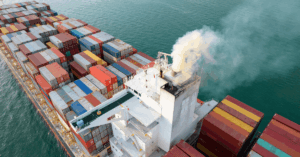Ammonia Set To Become Most Affordable Fuel By Late 2030s, Says New Analysis
A new insight brief from the Getting to Zero Coalition and the Global Maritime Forum found that the International Maritime Organisation’s (IMO) new policy measures are ambitious enough to drive a transition to scalable zero-emission fuels but will ultimately only succeed if they include meaningful rewards and, over time, higher penalties for non-compliance.
The brief, ‘IMO’s policy measures: What’s next for shipping’s fuel transition?’, uses total cost of ownership (TCO) modelling by UMAS and UCL and more than 30 stakeholder interviews to analyse the sector’s capital investment and operational options following the IMO’s adoption of global fuel intensity (GFI) factors and penalties for non-compliance. When adopted, those steps will make shipping the first industry with globally binding greenhouse gas regulations and emissions pricing.
While multiple compliance pathways exist today, the increasing GFI stringency and higher penalties will progressively favour scalable zero-emission fuels, pushing the industry away from fossil fuel-based options such as liquefied natural gas (LNG) and toward e-fuels based on green hydrogen.
While the analysis finds that e-fuels have the highest potential for shipping to achieve its long-term decarbonisation targets, early uptake and value chain development are needed if they are to reach commercial viability in time.
“The IMO’s new framework is a historic step forward, but unless e-fuels become competitive early on, there is a risk that the sector will run into bottlenecks as its decarbonisation efforts scale up,” Jesse Fahnestock, the Global Maritime Forum’s director of decarbonisation, said. “The industry can no longer afford to do nothing.”
Ammonia most affordable option beginning in late 2030s
The analysis shows that dual-fuel ships running on LNG and ammonia will be the most cost-competitive option before the mid-2030s, and that ammonia will become the cheapest from then on. However, this is mainly driven by blue fuels— which use hydrogen produced from fossil fuels with carbon capture—as synthetic e-fuels remain insufficiently incentivised before 2040.
The TCO modelling finds that even without targeted rewards to spur e-fuel uptake, conventional fuel is likely to be significantly more expensive than LNG and ammonia in the next decade. LNG will have the lowest comparative cost between 2030 and 2035, though this could be extended to 2037 through the use of onboard carbon capture and storage. Ammonia, specifically blue ammonia, is set to become the most cost-competitive option from 2037.
Given the long life spans of these investments, this is likely to make orders of dual-fuel ammonia vessels the competitive choice already today. To ensure that scalable e-fuel alternatives are made ready in time, however, the IMO guidelines must define rewards that ensure their competitiveness today.
“When considering the long-run demands of decarbonisation, ordering dual-fuel vessels capable of running on e-fuels already looks like a smart decision. But future adjustments to the policy can do a lot to encourage investment in e-fuel production facilities,” Fahnestock said.
Further adjustments needed to spur long-term investments
Insights from more than 30 stakeholder interviews indicate that many in the industry are considering a “wait and see” approach, prioritising short-term cost optimisation strategies—such as running conventional vessels on drop-in biofuels or LNG—while delaying investment in zero-emission options due to regulatory uncertainty, limited fuel availability, and perceived commercial risk. However, some respondents are exploring long-term strategies, ordering dual-fuel vessels, and seeking to use these to their advantage under the new framework.
The IMO’s policy architecture is based on a tiered GFI for every year for 2028-2035 and 2040. Two trajectories are set: a less stringent “base” line that divides undercompliance into different tiers, and a more stringent “direct compliance” line that vessels need to meet to avoid penalties. Vessels can either comply, under-comply, or over-comply in different tiers for any given year. Shipping companies can comply in several ways—by switching fuels, paying penalties to the IMO through remedial units (RUs), or buying surplus units (SUs) from ships that have overshot the targets. Vessels using zero- or near-zero-emission fuels will also receive a financial reward, though that is yet to be defined.
“We now have a regulatory foundation, but further developments and adjustments are needed if e-fuels are to become viable at an early enough stage to realise the industry’s decarbonisation ambitions. While doing nothing is no longer an option, the rules still need to be shaped in a way that incentivises the investments needed for shipping’s future,” Fahnestock said.
Press Release

